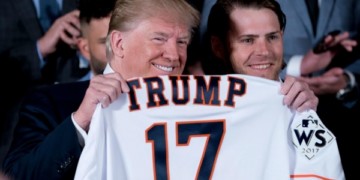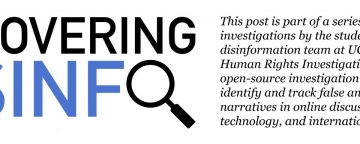Nick NugentBlockedUnblockFollowFollowingDec 7
TL;DR
Last week, CNN severed ties with liberal commentator Marc Lamont Hill for controversial remarks he made criticizing Israel in a speech at the United Nations. The outrage seemed to stem primarily from comments that, although vague, could be interpreted as endorsing violence against Israel and even ethnic cleansing. While some prominent conservatives pressured CNN to fire Hill and many more celebrated his sacking, CNN’s actions set a dangerous precedent. That a person can be so swiftly de-platformed based on ambiguous statements, even after explaining his true intent, is not only wrong; it sets a standard that could just as easily be used to de-platform anyone.
The Full Monty
Dr. Marc Lamont Hill is a professor of African Studies at Temple University and a somewhat regular media figure. As an occasional opinion commentator on CNN and, before that, Fox News, Hill has frequently criticized Israel for its treatment of Palestinians. On November 28, Hill appeared at an event organized by the United Nations Committee on the Exercise of the Inalienable Rights of the Palestinian People, a committee whose ostensible purpose is “to enable the Palestinian people to exercise their inalienable rights to self-determination,” but that some critics have described as openly anti-Semitic.
Delivering an impassioned 20-minute speech commemorating the 70th anniversary of the Universal Declaration of Human Rights, to which the nation of Israel was a signatory, Hill selected various articles from the Declaration and marshaled examples of how Israel allegedly violates those articles through its treatment of Palestinians.
Choice examples include the following:
While [Article 1 of] the Universal Declaration for Human Rights says that all people are quote born free and equal in dignity and rights, the Israeli nation state continues to restrict freedom and undermine equality for Palestinian citizens of Israel as well as those in the West Bank. . . .
While [Article 5 of] the Universal Declaration for Human Rights protects us against torture and cruel and inhumane or degrading treatment or punishment, Palestinians continue to be physically and psychologically tortured by the Israeli criminal justice system . . . .
[Article 10 of the Universal] Declaration of Human Rights insisted all humans are entitled to a quote fair and public hearing by an impartial tribunal. Israeli military courts, the exclusive adjudicator largely for West Bank residents, and in some cases Palestinian citizens of Israel, they have a conviction rate of more than ninety-nine percent.
Full transcript available here.
As far as it went, it was an effective and even lawyerly bit of rhetoric, irrespective of whether it was accurate. But the more controversial comments came when Hill appeared to endorse violence as potential tool of Palestinian resistance:
Contrary to Western mythology, black resistance to American apartheid did not come purely through Gandhi and non-violence. Rather, slave revolts and self-defense and tactics otherwise divergent from Dr. King or Mahatma Gandhi were equally important to preserving safety and attaining freedom. We must allow . . . the Palestinian people the same range of opportunity and political possibility. [W]e must recognize the right of an occupied people to defend itself. We must prioritize peace . . ., but we must not romanticize or fetishize it.
He then ended his speech by calling for “a free Palestine from the river to the sea.”
Conservatives (and some liberals) immediately pounced. David French of the National Review, accused Hill of anti-Semitism and, as additional evidence, pointed to Hill’s friendship with Louis Farrakhan, the Nation of Islam leader who once referred to Jews as termites. Philip Klein of the Washington Examiner noted that “the phrase ‘from the river to the sea’ has been a rallying cry for Hamas and other terrorist groups seeking the elimination of Israel, as a Palestinian state stretching from the Jordan River to the Mediterranean Sea would mean that Israel would be wiped off the map.” And thus the narrative grew that Hill had used a “dog whistle,” a seemingly innocuous phrase that conceals a more insidious meaning understood by those in the know. Put simply, Hill had surreptitiously tipped his hat to ethnic cleansing while maintaining plausible deniability.
But Klein didn’t limit himself to merely criticizing Hill. He noted that CNN had previously cut ties with other commentators and contributors for extreme statements, and he all but called on CNN to do the same to Hill. Executive Editor of the Washington Examiner, Seth Mandel, followed suit by firing off a series of tweets tagging CNN and effectively calling on the network to remove Hill. They soon got their wish. The next day, CNN fired Hill as a commentator with no more than a perfunctory non-explanation: “Marc Lamont Hill is no longer under contract with CNN.”
For his part, Hill responded to the criticisms against him, and his termination by CNN, by qualifying and defending his remarks: “My reference to ‘river to the sea’ was not a call to destroy anything or anyone. It was a call for justice, both in Israel and in the West Bank/Gaza. . . . I do not support anti-Semitism, killing Jewish people, or any of the other things attributed to my speech.”
But to no avail. Hill has joined the pantheon of cable news pariahs, and conservatives seem strangely gleeful of his de-platforming. Why “strangely”? Because such glee flies in the face of their usual defense of free speech. For the most part, it’s been conservatives who have chronicled, with angst, the snowflake culture that now prevails in universities, where students can shout down or physically intimidate professors who say things that offend them. Conservatives who rightly maintain that “hate speech” is fully protected speech under the First Amendment and, incidentally, a bogus and intentionally undefined category. And conservatives who rend their garments when controversial speakers are booted from social media platforms like Facebook and Twitter. It’s therefore perplexing that some conservatives should cheer the machinery of private censorship in this case just because it’s being used to take down an ideological opponent. Don’t they realize that the same machinery could be used against them?
Perhaps they see little risk of that because they’re not in the same category as Hill. “Hill didn’t stop at criticizing Israel,” they might say. “He called for violence and even ethnic cleansing. I’m OK with de-platforming those kinds of speakers. And because I myself don’t endorse violence or ethnic cleansing, that standard couldn’t be used to de-platform my speech.”
The problem with that logic is that Hill’s statements were ambiguous. For every good argument that Hill was using a dog whistle, there’s a good counter-argument that he wasn’t. Consider Slate’s take:
It’s true that organizations like Hamas, which fires rockets at civilian targets, uses “from the river to the sea” to describe its desire for a free Palestine. But that is also true of Israel’s ruling right-wing Likud party as well. In the Likud’s founding charter from 1977, 10 years before the founding of Hamas, the very first paragraph says “between the Sea and the Jordan there will only be Israeli sovereignty.” . . .
“From the river to the sea” has also been used, neutrally, by Jewish journalists to describe the area again and again. Jewish settlers who live beyond the green line in Israel Defense Forces–protected settlements live by this slogan as well. An Israeli minister used the phrase to dismiss the prospect of a two-state solution, saying, “There is no other option but the state of Israel, certainly between the Jordan [River] to the sea there will be one state.”
But we need not pore over Hill’s words like ancient writ, straining to divine the author’s true intent, when we can consult the Oracle himself: Hill.
But isn’t this simply a post hoc rationalization? As one who has studied and spoken at length on the Israeli-Palestinian conflict, surely Hill would have known the provenance of the phrase and its true meaning. That he was intending to refer to an obscure British Mandate instead of the commonly understood meaning strains credibility. That may be true. But if so, shouldn’t Hill’s comments after the fact count for something? We’ve all chosen the wrong words on occasion, whether out of clumsiness in speaking off the cuff or because we get caught up in the moment and go a little overboard. Sometimes, as may have been the case with Hill, we’ve carefully planned our words and drafted our prepared remarks but neglected to get critical feedback from a diverse array of reviewers before we speak. Confined to our limited perspective, we fail to appreciate how our words will strike others. And only afterward, when a public backlash functions as a far more painful substitute for the constructive feedback we could’ve (and should’ve) gotten in advance, do we realize what a terrible mistake in our word choices. Shouldn’t we allow people to clarify when they’ve said things they didn’t mean or even to un-say things they did mean after they’ve realized their folly? Do we really want to live in a society where a single injudicious remark can stain a person with indelible guilt?
And does CNN’s rush to judgment not concern us just a little? It takes time to get to the bottom of a matter, to hear and consider the accused’s defense (which was not done in this case), and, after all of that, to simply ruminate for a few days on the right decision once the emotion of the moment has passed. We call that due process when it involves state actors; shouldn’t we strive for something approximating it in the private sector? No doubt CNN behaved as it did to show swift and decisive action, to quickly virtue-signal lest anyone try to impute Hill’s guilt to the company.
OK, you might say, but since CNN, social media companies, and other sovereigns of cyberspace are already in the business of de-platforming controversial speakers, we should at least make sure they play fair. If they’re going to ban alt-righties for saying things that sound like eerily like ethnic cleansing, then they’re damn well going to hear from us when they fail to bring down the hammer on alt-lefties who say similar things. But that’s not the right way to think about it. Before demanding that a platform provider administer a rule equally, we ought first to ask if it’s a rule we really want to live under.
Extracting the facts from this case, we find the following rule:
It’s OK to
(a) immediately de-platform a person (without first giving him the opportunity to explain or defend himself)
(b) for words he spoke in his personal capacity (outside of the scope of his employment or contract)
© where a plausible argument can be made by others that such words amount to a call to violence or are otherwise extremely offensive, but
(d) where such words do not literally and unambiguously advocate violence but admit of other, plausible, non-violent and non-offensive interpretations, and
(e) where the speaker later clarifies that the violent and offensive interpretation of his words is not the correct interpretation.
It should be plain that we cannot abide such a rule. It should be equally plain that such a rule endangers liberals and conservatives alike.
Suppose a C-level executive in a Fortune 500 company, an evangelical Christian, is invited to speak at a “Christians in Business” conference. Lamenting the declining moral state of the country and caught up in a moment of inspired boldness, he calls for a “modern-day crusade to take America back for Jesus.” Under the “Hill Rule,” what’s to stop his company from summarily dismissing him after a video of the event goes viral and he’s accused of endorsing violence against Muslims by his reference to barbaric Medieval Crusades? Or a private school teacher who gets fired for racist remarks after affectionately calling some neighborhood kids, some of whom happen to be black, “little monkeys” when she finds them climbing in trees on her property? (Compare with Ron DeSantis’s “monkey” flap.) Or a public outcry to blame a media figure for a tragic mass shooting because the figure posted a picture showing vulnerable elected officials from the opposing political party behind stylized cross hairs? (Compare.)
Hopefully, these examples suffice to show just how easily the “Hill Rule” could be used to silence almost anyone for something they’ve said, whether foolish (and regretted) or completely innocent. And if a platform provider doesn’t apply the rule fairly? Well, what of it. The provider’s bias and hypocrisy will eventually become obvious and embarrassing. But even if it doesn’t, standing against a pernicious rule applied unfairly is certainly better than embracing the rule to make ensure all parties are equally wronged by it.





























Connect with us